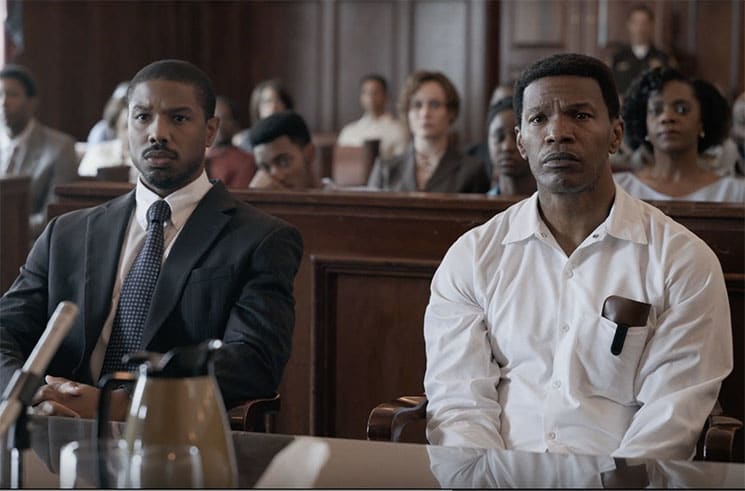Have you ever listened to the sounds of the labour you perform? Legal drama Just Mercy opens with the sounds of a chainsaw roaring, the strain of a rope against the trunk of a tree, the cracking of limbs falling in the forest, and Jamie Foxx's Walter McMillian listening, breathing, looking up at the air rustling through branches.
The film is based on the true story of McMillian, a pulpwood worker in Monroeville, Alabama (hometown of Harper Lee and Truman Capote) who, in 1987, was wrongfully convicted of a murder and sentenced to death, but put on death row before he receives a trial. It's based on the book by McMillian's defense attorney, Bryan Stevenson, played by Michael B. Jordan, and is directed by Destin Daniel Cretton. Stevenson founded the advocacy non-profit Equal Justice Initiative (EJI) alongside Eva Ansley (played by Brie Larson).
Watching the movie is like being in a vise-grip. The brutality, the unwarranted police pull-overs, the unrelenting bigotry all create a suffocating tension that isn't relieved until the denouement. The hope held by McMillian's family, when they make moments to laugh, helps to puncture the pressure, facilitating catharsis throughout, because otherwise the film is tremendously emotionally taxing. The humour Cretton creates out of the town's hypocrisy in celebrating To Kill A Mockingbird in the face of its ever-present bigotry also helps to expel a kind of weariness that the film brings on, a weariness that we shouldn't have, but that we do.
This advocacy film is as much about the present as it is about the past. Foxx, Jordan, and Larson partnered with Innocence Canada, a non-profit that works to exonerate those who have been wrongfully convicted. The actors' campaign opened the media screening.
Outside of its advocacy aspect, the film is fine. Foxx portrays McMillian with immense earnestness and nuance, imbuing him with dregs of ineradicable hope, which one can't but maintain in face of death. McMillian anchors his mind in the present through deep breaths and thoughts of the wind through the trees amongst which he worked; he retraces his visceral, human connection to nature established at the film's beginning again and again, and Foxx depicts this beautifully. McMillian's frustration at having lost so much time of his life, at having lost his connection to the earth, pierces through Foxx's eyes and bursts through his body, the helpless way he bangs on a table to stop Stevenson from listing the litany of legal procedures that might help him, and finally in the physical revulsion against his cell.
Meanwhile, Jordan is great as Stevenson — depicting monumental changes in the character through the smallest facial movements. Larson, on the other hand, falls flat as Ansley. Though Ansley is ostensibly on the right side of history, the character isn't really written with nuance; Ansley is only ever and always indignant. She seems only to be huffs of outrage and eyebrow raises of disbelief at systemic racism, as though she's only just learning of the environment surrounding her.
Just Mercy is an emotionally charged film that will make you angry, cry and smile. But don't forget that it's based on fact, and that fact abides, still.
(Warner Bros.)The film is based on the true story of McMillian, a pulpwood worker in Monroeville, Alabama (hometown of Harper Lee and Truman Capote) who, in 1987, was wrongfully convicted of a murder and sentenced to death, but put on death row before he receives a trial. It's based on the book by McMillian's defense attorney, Bryan Stevenson, played by Michael B. Jordan, and is directed by Destin Daniel Cretton. Stevenson founded the advocacy non-profit Equal Justice Initiative (EJI) alongside Eva Ansley (played by Brie Larson).
Watching the movie is like being in a vise-grip. The brutality, the unwarranted police pull-overs, the unrelenting bigotry all create a suffocating tension that isn't relieved until the denouement. The hope held by McMillian's family, when they make moments to laugh, helps to puncture the pressure, facilitating catharsis throughout, because otherwise the film is tremendously emotionally taxing. The humour Cretton creates out of the town's hypocrisy in celebrating To Kill A Mockingbird in the face of its ever-present bigotry also helps to expel a kind of weariness that the film brings on, a weariness that we shouldn't have, but that we do.
This advocacy film is as much about the present as it is about the past. Foxx, Jordan, and Larson partnered with Innocence Canada, a non-profit that works to exonerate those who have been wrongfully convicted. The actors' campaign opened the media screening.
Outside of its advocacy aspect, the film is fine. Foxx portrays McMillian with immense earnestness and nuance, imbuing him with dregs of ineradicable hope, which one can't but maintain in face of death. McMillian anchors his mind in the present through deep breaths and thoughts of the wind through the trees amongst which he worked; he retraces his visceral, human connection to nature established at the film's beginning again and again, and Foxx depicts this beautifully. McMillian's frustration at having lost so much time of his life, at having lost his connection to the earth, pierces through Foxx's eyes and bursts through his body, the helpless way he bangs on a table to stop Stevenson from listing the litany of legal procedures that might help him, and finally in the physical revulsion against his cell.
Meanwhile, Jordan is great as Stevenson — depicting monumental changes in the character through the smallest facial movements. Larson, on the other hand, falls flat as Ansley. Though Ansley is ostensibly on the right side of history, the character isn't really written with nuance; Ansley is only ever and always indignant. She seems only to be huffs of outrage and eyebrow raises of disbelief at systemic racism, as though she's only just learning of the environment surrounding her.
Just Mercy is an emotionally charged film that will make you angry, cry and smile. But don't forget that it's based on fact, and that fact abides, still.




